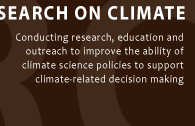

CONGRESS AND USABLE SCIENCE |
|
Congress has supported science generously over the last half-century, but not without occasional calls for more accountability. Science is not an entitlement program, and has always needed justification as a national priority. Justifications have ranged over time, including issues such as workforce preparedness, economic competitiveness, technological advantage, military superiority, and so on. But these debates tend to focus on broad national trends, and assume that science is useful regardless of the makeup of our nation’s science portfolio. Whatever the merit of these arguments, they rarely propose that science funding programs reconcile supply and demand of information. For example, the Global Change Research Act of 1990, which required funded research to generate information useful to policy makers, did not specify the process for ensuring this outcome. Nonetheless, calls for science to be more relevant to specific policy problems such as climate change, nanotechnology, and global health are becoming more prevalent. Congressional members and their staff can be quite influential in shaping this policy debate and ultimate national position toward usable science. Over the years, members of Congress have run hearings, introduced legislation, and initiated changes in science policy such as the broader impacts criterion for NSF proposals, an issue championed by Barbara Mikulski, and the integration of social, environmental, and ethical concerns into nanotechnology research priorities. |
 |